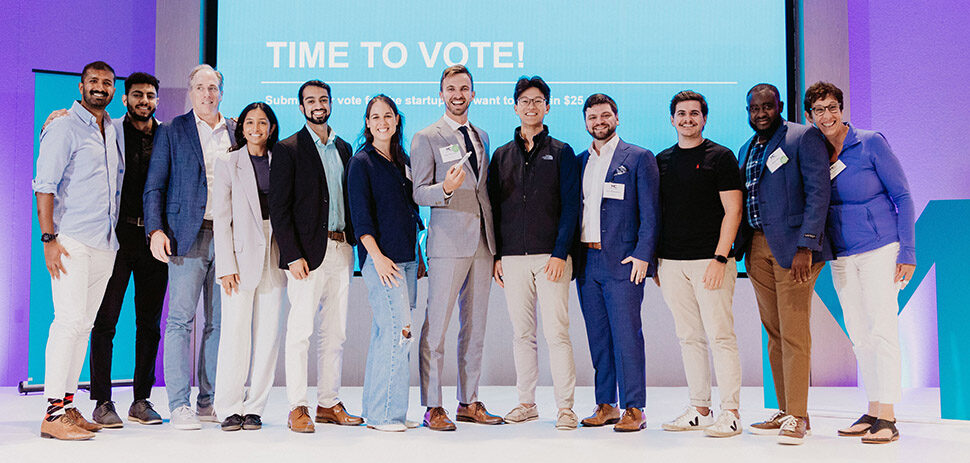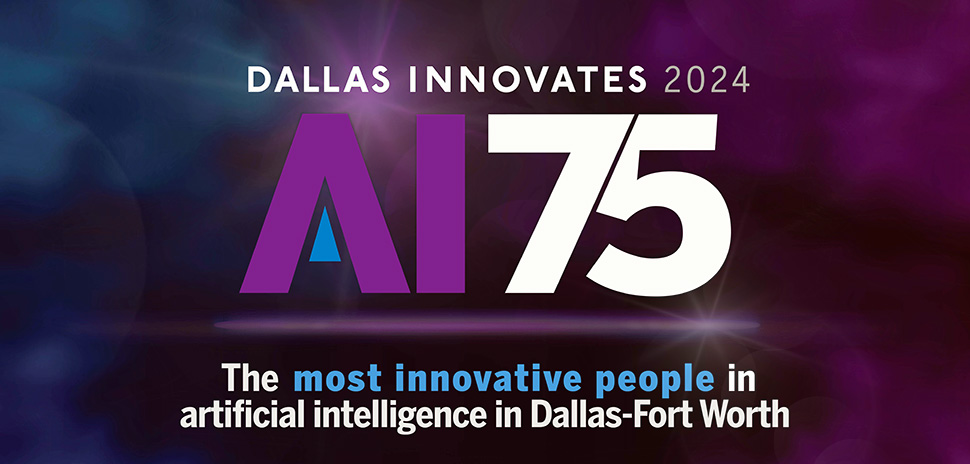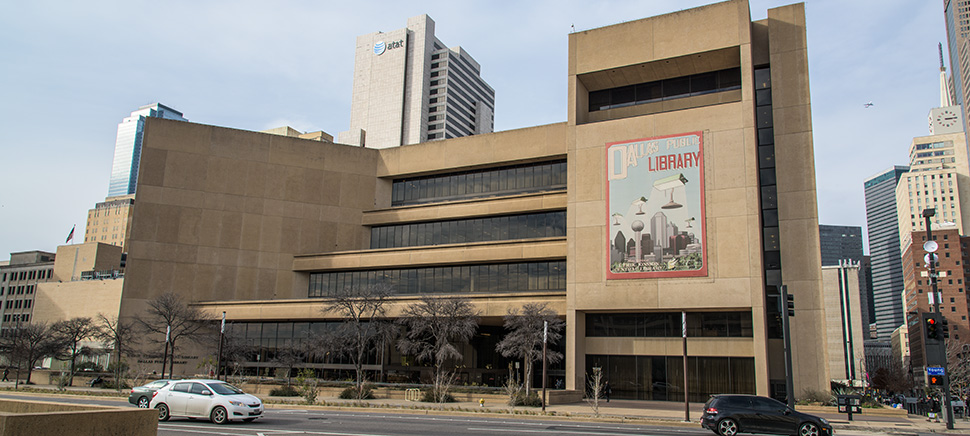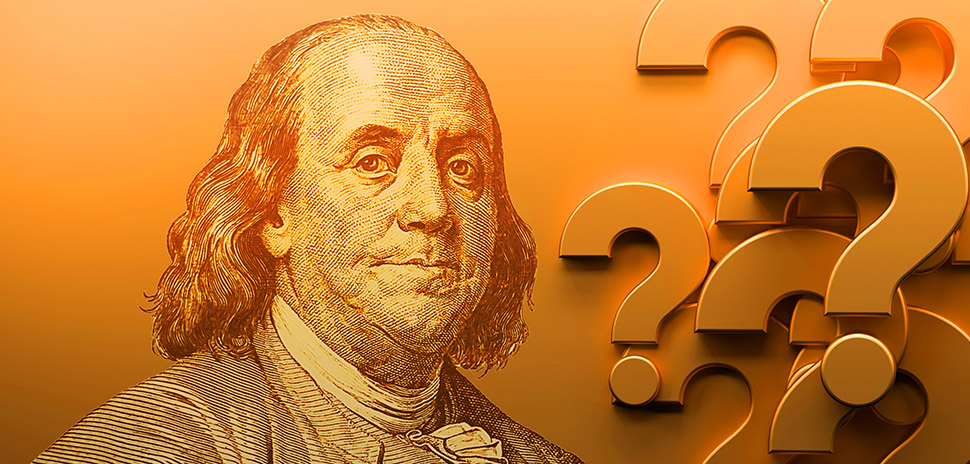MassChallenge, the global startup accelerator, sure knew how to gin up excitement on the last day of its MC | Innovate 2024 conference.
Held Sept. 24-25 at Dallas’ Pegasus Park, where the Boston-based, zero-equity nonprofit has its local office, the conference connecting U.S. Early Stage entrepreneurs with international innovators and investors wrapped up with a live pitching competition among 10 startup founders. Their companies represented industries ranging from biotech and staffing to fit-tech.
Between Sept. 6 and Sept. 13, nearly 10,000 online voters from the general public and the MC community had watched about 30 pitch videos and whittled that number down to 10 finalists. All participants were members of the accelerator’s 125-person, industry-agnostic Early Stage cohort, which began meeting in early July.
The finalists were competing for the 2024 MassChallenge Community Choice Award, sponsored by NexPoint and valued at $25,000.
Over a one-hour period on Sept. 25, each contestant had up to five minutes to pitch their startup to a live audience of conference attendees. The attendees then were asked to vote immediately for their favorite founder via the MC | Innovate Event app. Anticipation was high as the results were tabulated and a photo-ready, “Texas-sized” check was prepared in another room for the top vote-getter among the following 10 startups:
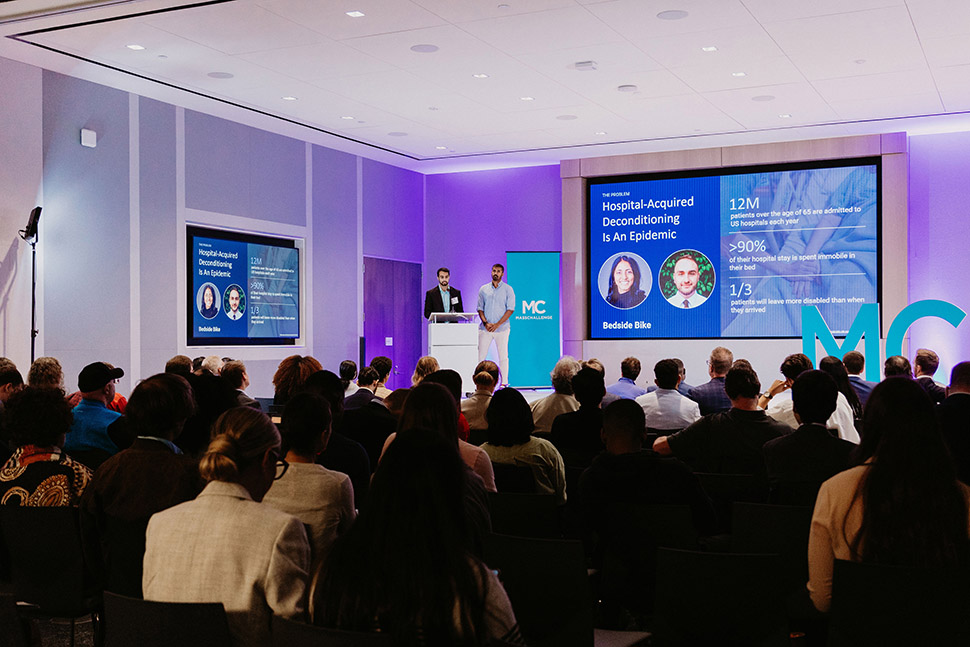
Bedside Bike’s Neil Jairath pitches for the 2024 MassChallenge Community Choice Award. [Photo: MassChallenge]
Bedside Bike: The competition kicked off with a pitch by Neil Jairath and Monil Patel, cofounder/CEO and cofounder, respectively, of Bedside Bike. The startup offers a compact, portable pedaling device that clamps to the end of a hospital bed, allowing the user to engage in “gentle and controlled” physical activity. Bedside Bikes are needed, Jairath said, because hospital patients spend more than 90% of their time immobile, leaving one in three with a new or worsened disability once they’re discharged. The product helps hospitals and insurers save money while returning patients to their families faster and healthier, Patel said.
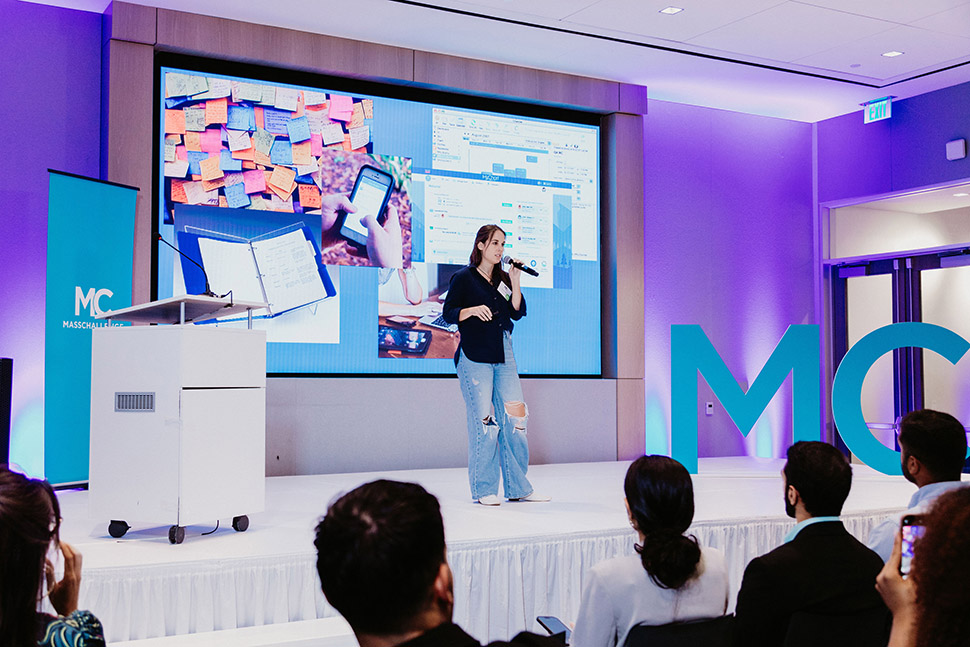
Cami Health’s Olivia Adams pitches for the 2024 MassChallenge Community Choice Award. [Photo: MassChallenge]
Cami Health: Olivia Adams said she was inspired to found Cami Health by her youngest son, Cameron, who was born with multiple disabilities. After trying to keep up with the different therapies and medications required for Cameron’s health, she said she started the company to help other “families with medically complex children juggle fragmented systems.” Essentially a personal assistance software app, Cami compiles and organizes all of a child’s health records in one place, reducing stress on parents and decreasing healthcare spend. Down the road, Adams added, the app may also be used by disabled adults and by adults coping with aging parents.
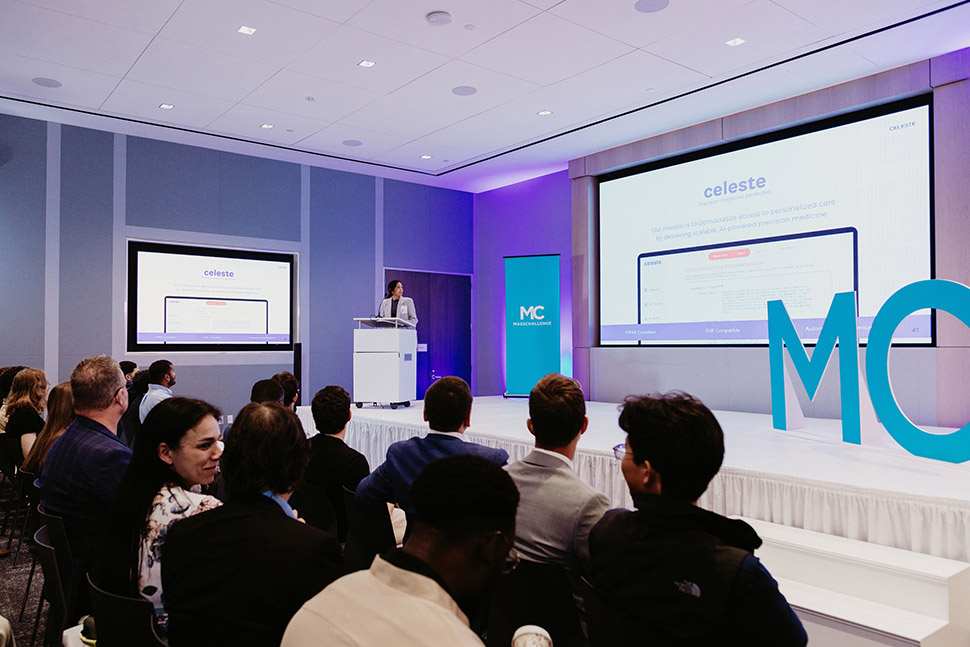
Celeste’s Athena Doshi pitches for the 2024 MassChallenge Community Choice Award. [Photo: MassChallenge]
Celeste: Athena Doshi, founder of Celeste Health, said “50% of first-cycle” medical treatments fail. So, she started the company to “help doctors deliver smarter, more proactive care” from the get-go. Celeste, an AI-powered, precision medicine company, integrates “patient data, clinical guidelines, hospital formularies, you name it, to deliver personalized, real-time care plans,” Doshi said. The result, she added, has been a reduced burden on clinicians, fewer referrals and hospital readmissions, and less medication waste.
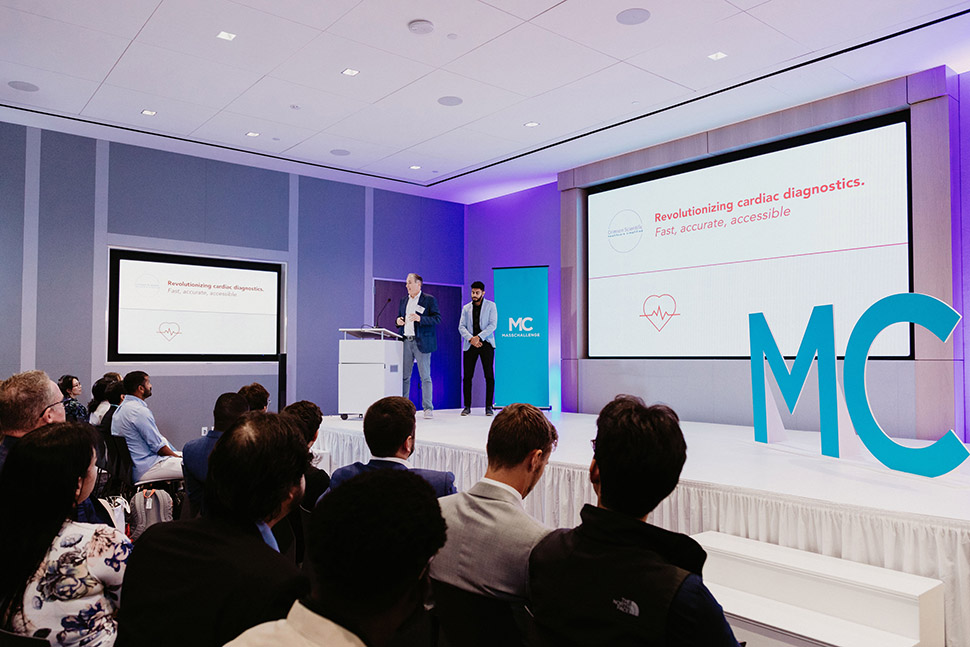
Crimson Scientific’s Michael Cetta pitches for the 2024 MassChallenge Community Choice Award. [Photo: MassChallenge]
Crimson Scientific: Anyone who’s undergone an electrocardiogram test knows how slow and clumsy the process is and how irritating those sticky patches can be! Co-founders Michael Cetta and Mark Zachary, CEO and CTO, respectively, of Crimson Scientific, believe they’ve developed a good alternative to old-fashioned EKG technology: a weighted cardiac pad with 30 dry, AI-enabled electrodes that “simply rests on the patient’s chest.” The device and proprietary software will be faster, more accurate, and more efficient than traditional EKGs, the founders said, reducing mortalities and costs and increasing access to electrocardiogram technology.
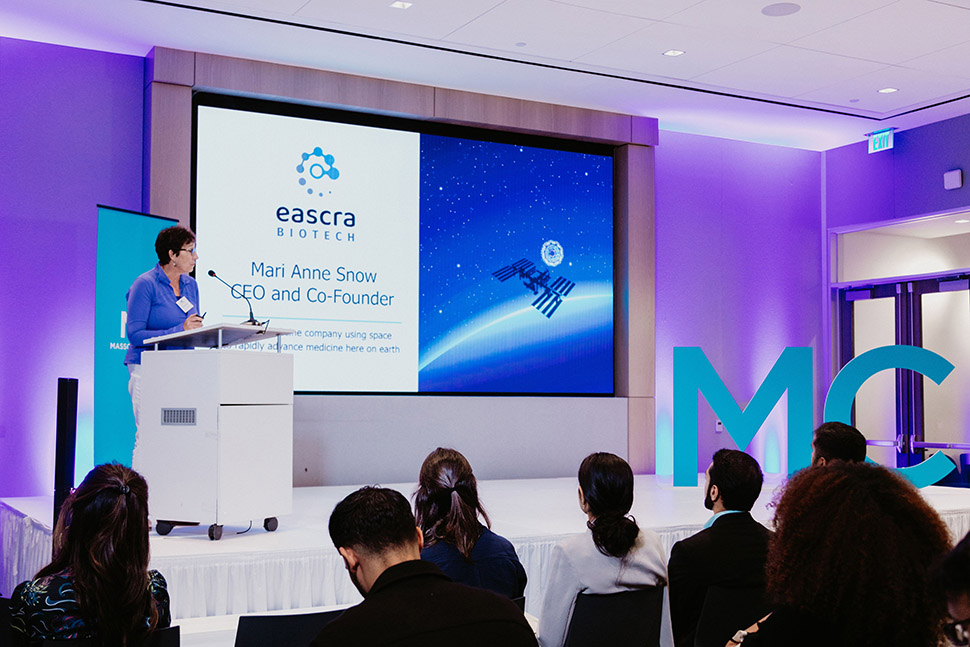
Eascra Biotech’s Mari Anne Snow pitches for the 2024 MassChallenge Community Choice Award. [Photo: MassChallenge]
Eascra Biotech: Co-founder and CEO Mari Anne Snow said Eascra Biotech’s proprietary therapeutic delivery platform is focusing its efforts first on arthritis, which affects 24% of adults worldwide. The nanotech startup builds breakthrough “Janus-base nanomaterials” that enables enhanced delivery and regenerative treatment for such conditions, Snow said. “Thus, we’re providing real restorative solutions where current treatments fail,” she said. The company is part of an elite group of life-science companies using space to develop the technologies, Snow added, and is the first ever to make medical nanoparticles on the International Space Station.
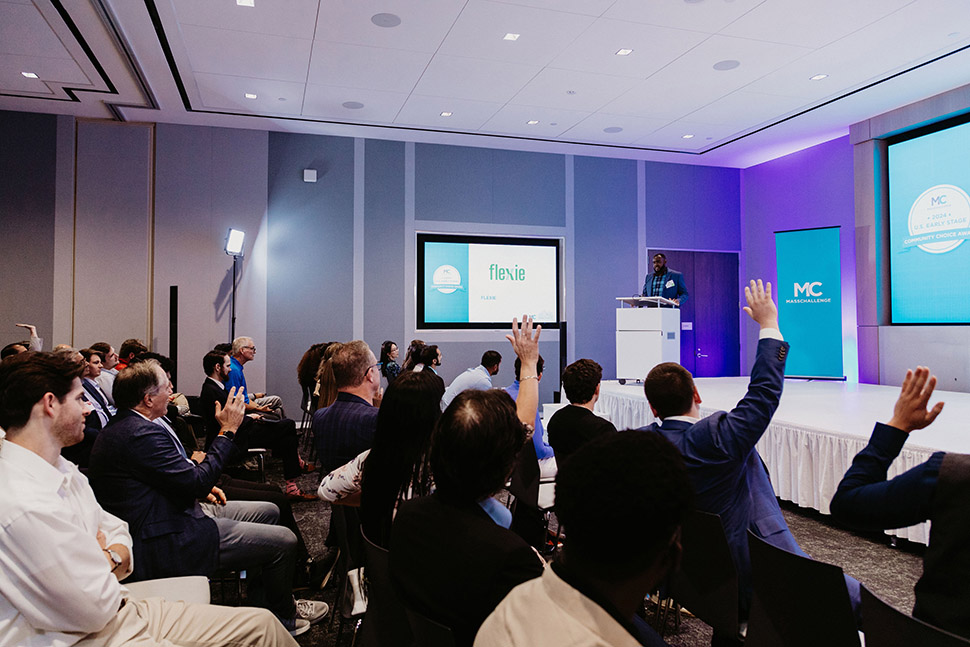
Flexie’s William Ward pitches for the 2024 MassChallenge Community Choice Award. [Photo: MassChallenge]
Flexie: According to founder William Ward, Flexi offers a staffing app that connects fast-food restaurants to qualified pre-screened workers, reducing the labor costs eateries absorb due to high turnover rates. In addition to assisting companies like Chick-fil-A and McDonald’s, the app enhances “the lives of students, immigrants, and everyday people, helping them get their first jobs and meet their financial needs every day,” Ward said. Flexi has also embedded features in the app to help workers in areas including telemedicine and financial literacy.
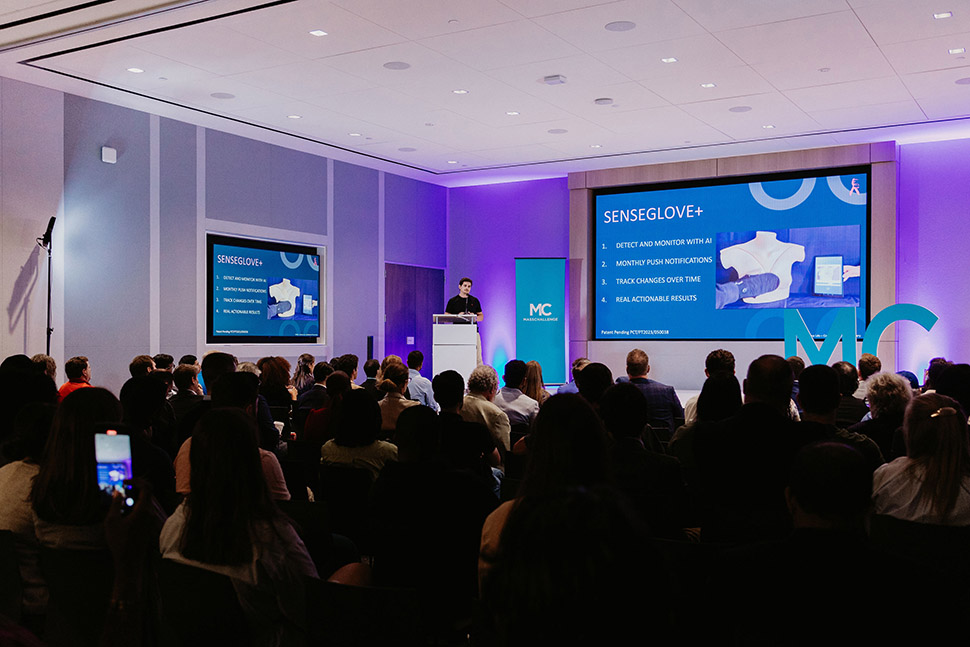
Glooma’s Francisco Nogueira pitches for the 2024 MassChallenge Community Choice Award. [Photo: MassChallenge]
Glooma: Francisco Neto Nogueira, co-founder and CEO, said Glooma’s mission is helping women self-detect breast cancer at an early stage. The startup’s portable medical device—a glove combining pressures sensors and AI called the SenseGlove—is linked to a mobile app that enables “self palpation” to discover abnormalities in the breast in the comfort and privacy of a woman’s home. “We are selling confidence and peace of mind to women,” Nogueira said. He added that the company’s “proof of concept” came in 40 patients, with the sensors getting “the diagnosis right 88% of the time with only a 12% rate of false positives and a perfect record with no false negatives.”
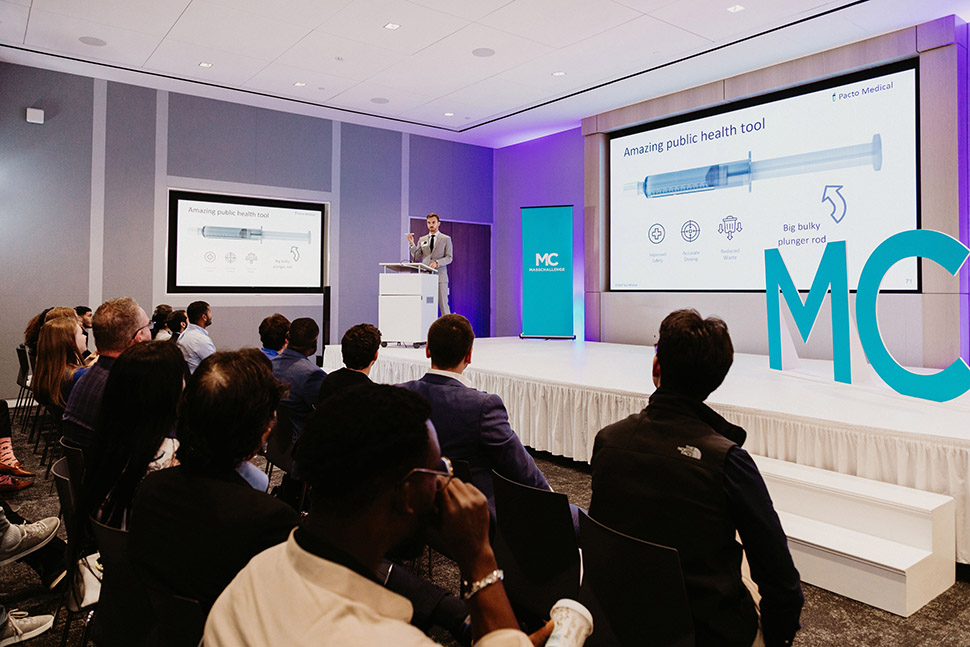
Pacto’s Robert Halvorsen pitches for the 2024 MassChallenge Community Choice Award. [Photo: MassChallenge]
Pacto Medical: A medical device company, Pacto is specializing now in pre-filled syringes that fit the same dosage of medicine into a smaller package, said Robert Halvorsen, the startup’s co-founder and CEO. The result: lower shipping costs, environmental savings, and greater access to pre-filled syringes (seven billion of them circulate through the healthcare system each year). “We’re starting with the 10-milliliter saline flush and rapidly expanding into other medications and sizes, like vaccines, so we can maximize our impact and try to get pre-filled syringes in the hands of as many people who need them as possible,” Halvorsen said.
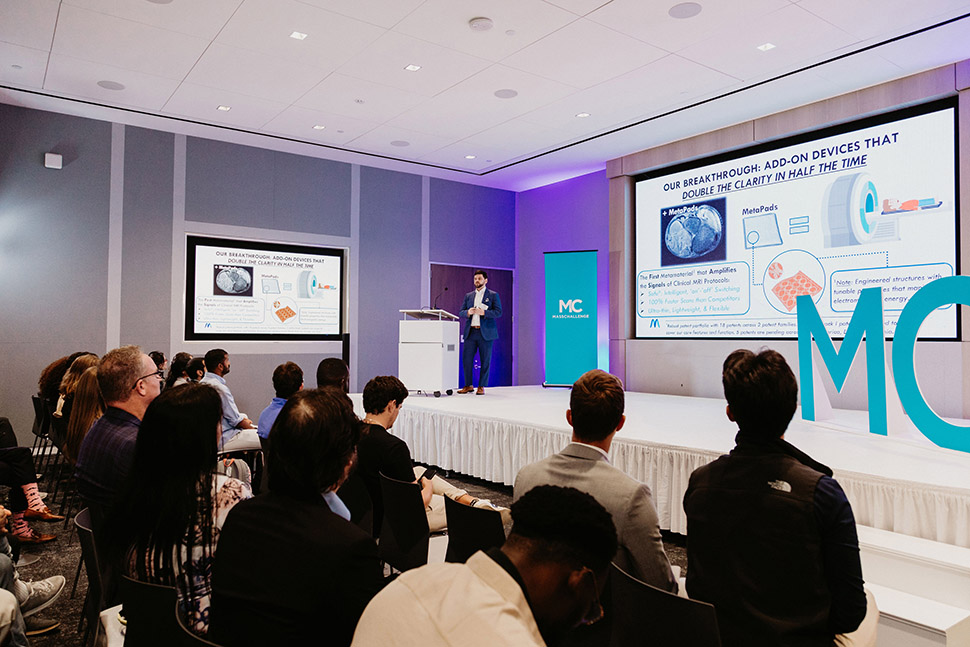
PriMetaz’s Ryan McNaughton pitches for the 2024 MassChallenge Community Choice Award. [Photo: MassChallenge]
Primetaz: CEO Ryan McNaughton said Primetaz is out to “turbocharge” the “incredibly slow and uncomfortable” world of MRIs. The company’s intent is to speed up the current MRI process by building and adding patented “meta pads” to the table of the MRI scanner. That will result in images that are 100% faster and have twice the clarity of current scans, he said. Primetaz “envisions a world where there’s a meta pad for every MRI indication,” McNaughton added, allowing “us to have a $7.6 billion total addressable market globally.”
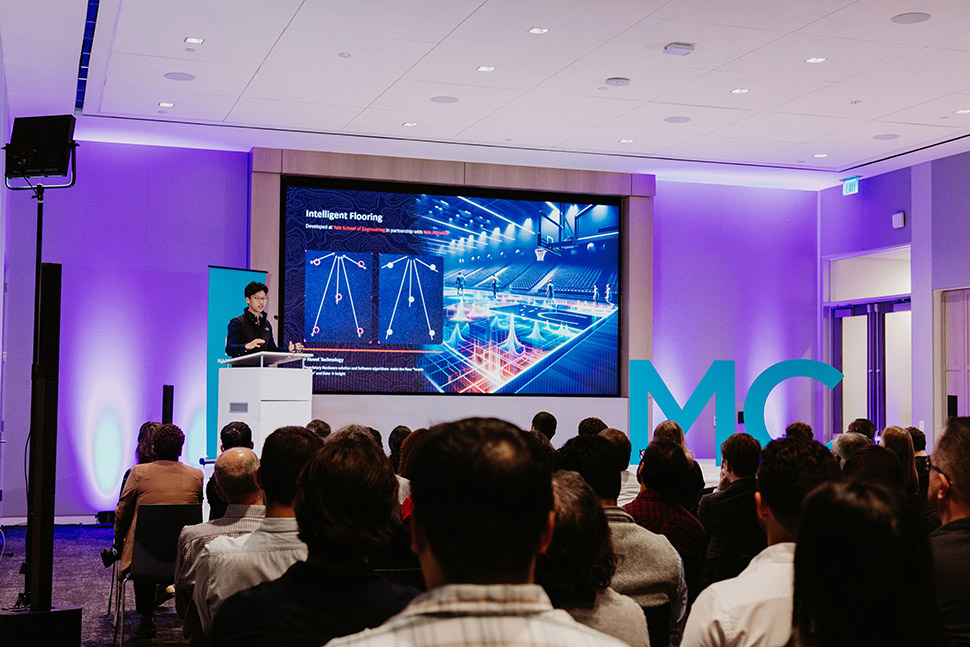
Vault’s Joshua Gao pitches for the 2024 MassChallenge Community Choice Award. [Photo: MassChallenge]
Vault Kinetics: The fit-tech startup specializes in electronic-embedded “smart flooring technology,” capturing thousands of data samples and a number of different indices to provide an overview of an athlete’s performance in real time. According to co-founder Joshua Gao, the technology can help elite athletes optimize their training and prevent injuries. The company’s “moonshot vision” has led now to Vault Kinetics’ first sales, Gao said, adding, “All this has happened very, very fast, and we’re doing our best to keep up.”
And the winner is…
When the pitches were finished and the winner had been decided behind the scenes, the conference attendees gathered again to hear first from Cait Brumme, MassChallenge CEO, and then from Lucy Bannon. Bannon is chief communications officer with NexPoint, a multibillion-dollar alternative investment platform and the pitch contest sponsor.
“MassChallenge likes to say we are not an investment fund, we are a community,” Brumme said. “And one of the ways we bring that commitment to life is through our Community Choice Award each year.”
She then thanked all the founders who participated in the award event and said that NexPoint is building a life-sciences ecosystem in North Texas, allowing companies to build for the future.
With that, Bannon took the stage, called for attendees to make noise like “a drumroll,” and presented the oversized check to the competition’s surprised winner: Olivia Adams of Cami Health, the personal assistance software app for families with medically complex children.
Asked what she planned to do with the $25,000, Adams told Dallas Innovates that it would go to help pay her salary.
“Right now, this is all my blood, sweat, and tears—my free time, and I have a whole family to support,” she said. “So, this allows me to focus more of my time on Cami so I can help more people. And it’s also going to go toward marketing and supporting other families that can’t pay for a solution like Cami right now, so that more families can access it without the burden of cost.”
![]()
Get on the list.
Dallas Innovates, every day.
Sign up to keep your eye on what’s new and next in Dallas-Fort Worth, every day.

